

[Once the film was completed and in the editing process, the original opening, filmed in July 1962, was deemed too sparse and not of the same visual quality as the rest of the film. It was slightly rewritten and filmed again in February 1963, after the entire film had been shot, wrapped, and all the cast had gone to their respective homes. At great additional expense, those necessary for the "new" opening, traveled to Spain to film the opening we see in the completed film. For your interest, the original opening follows:]
The film opens with an aged and weathered painting of a battlefield on an ancient stone wall. As the Narrator speaks, the painting slowly becomes newer and fresher until it appears to be a frozen scene of the battlefield.
The frozen scene comes to "life" and we see the battlefield, covered by the intermingled dead and dying of both Pompey and Caesar. Destroyed horses, broken wagons and impedimenta of war. A great carnage has taken place. A small stream runs through the field. The blood of those who have died beside it has flowed into the water, coloring it. Occasional funeral pyres are already burning; the smoke of others is visible beyond the hill. Battle standards, weapons, etc. are being collected and salvaged. Incongruously, a few shepherds usher their sheep onto the battlefield which is, after all, their grazing land.
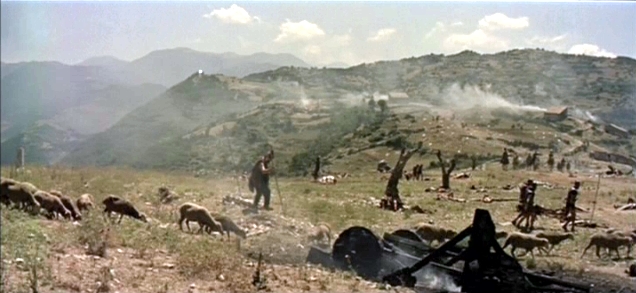


Caesar brings his horse to a halt, the others drawing alongside him. He looks out over the carnage:
Flavius scrambles from his donkey and down toward the stream. From another direction, over another hill, a quickly riding horseman can be seen approaching. It is Mark Antony. His horse is covered with sweat; he, himself, is grimy and blood-stained. More than any of them, Antony looks as if he had been in the middle of the carnage. He dismounts. Caesar calls out to him...
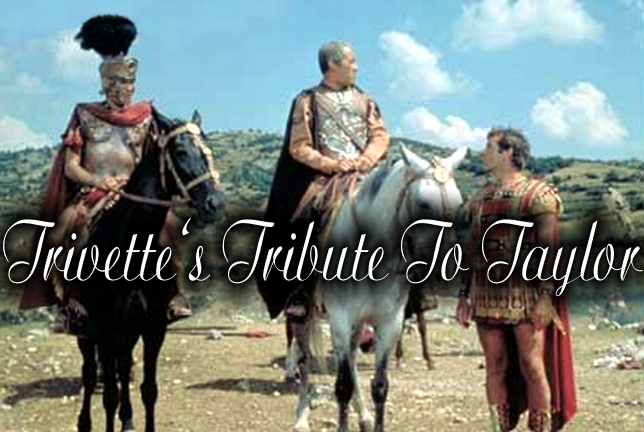
Flavius arrives with Caesar's water.
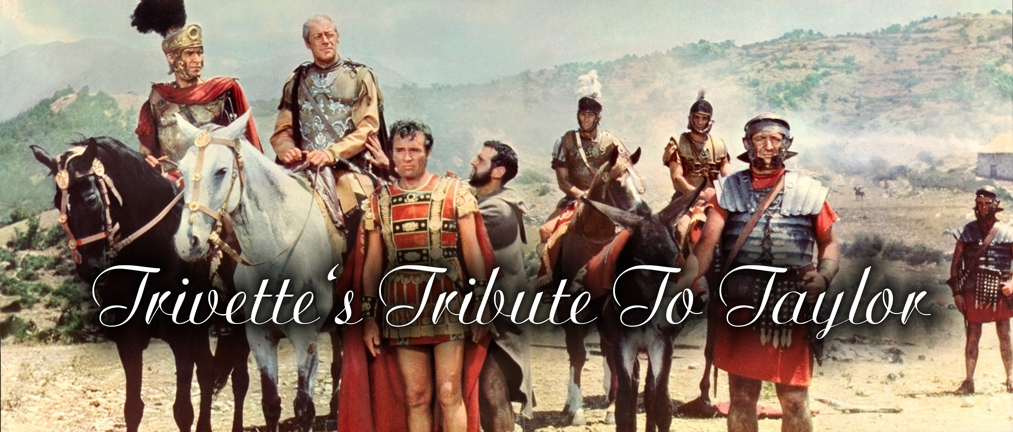
As he drinks, Flavius swiftly pantomimes. Caesar understands. The others are a little mystified.
He rides off..
Antony smiles and nods...
Antony salutes and starts toward his horse. Suddenly, Caesar calls after him:

Both he and Rufio react incredulously.
A pause.
[Later
in the film, there is a meeting of Senators at Cleopatra's villa in Rome.
At the meeting, Caesar makes a demand to be made "Emperor of Rome". During
that sequence, Caesar makes reference to this scene, and reminds Brutus
that at Pharsalia, "...Antony was hot to separate you from your head -
with just cause. It was by my command - my dictate, if you
will - that you stand here tonight dribbling virtue out of the corners
of your mouth!" In the re-written opening, references to Brutus, and Caesar's
pardon of him, were omitted. This is most likely the result of eliminating
Antony from the re-write as well. The reason for removing Antony from the
opening is not quite clear. Perhaps, because of the structure of the film,
with Antony's part being dominate in the second half, it may have been
thought unwise to bring him in so early.]
He rides off.
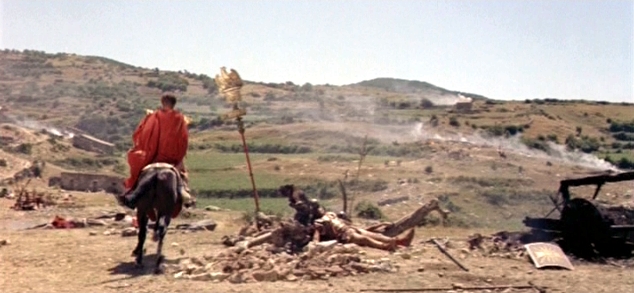
With the "new" opening scene, the film opens as we see it; Caesar is viewing the battlefield of Pharsalia, in Greece, where his troops have defeated the army of fellow Roman, Pompey, who instigated this "Roman Civil War". Caesar learns that Pompey has escaped, most likely to Egypt. The narrator tells us that, "...just as the Romans, so the Egyptians made war one upon the other. For young King Ptolemy would no longer share the throne with his sister Cleopatra - but drove her from the city of Alexandria and sought to destroy her." The narration above is heard over the image of an ancient frieze. As the narration continues, the frieze become less aged, and continually clearer until it is a freeze-frame from the film. We now see the image clearly. *** Ptolemy, Cleopatra's brother. The freeze-frame moves into action on this scene. [The narrator has brought our attention to, in order, Ptolemy, then Cleopatra. The uncut film would have done the same, introducing us first to Ptolemy, and, in the following scene, Cleopatra.] Sulking on a bejeweled chair near the entrance of his command tent, scowling out at the white sand and imposing encampment about them, is Ptolemy. He is about seventeen years old - resplendent in golden armor.

In attendance nearby are several priests. Behind Ptolemy's chair stands Pothinos, Chief Eunuch and Court Chamberlain. He is turned toward a group, which is seated before a food-laden table, apparently deep in deliberation. Most important are Achillas, General of the Army of Egypt, and Theodotos, Chief Tutor to the King. The frieze moves into action:
A shrill exclamation from Ptolemy. They all look over at him. Slowly, the young king rises to his feet and stares. On the tent flap rests a magnificent butterfly, gently moving its wings. Ptolemy stealthily crosses and catches it in his fingers. He turns to his bewildered court:
He slams the butterfly to the floor. Its wings beat feebly. The scene dissolves to the interior of the Temple of Isis at Cleopatra's encampment by the sea. [This would have been our very first glimpse of Elizabeth Taylor as Cleopatra in the unedited version of the film.] With her eyes closed, she is veiled and seated below the goddess Isis.
[The image below is an actual screen capture from the same source the film makers used in making the documentary, "Cleopatra: The Film That Changed Hollywood". Incredibly, inconceivably, they did not use this "lost" footage?!?]
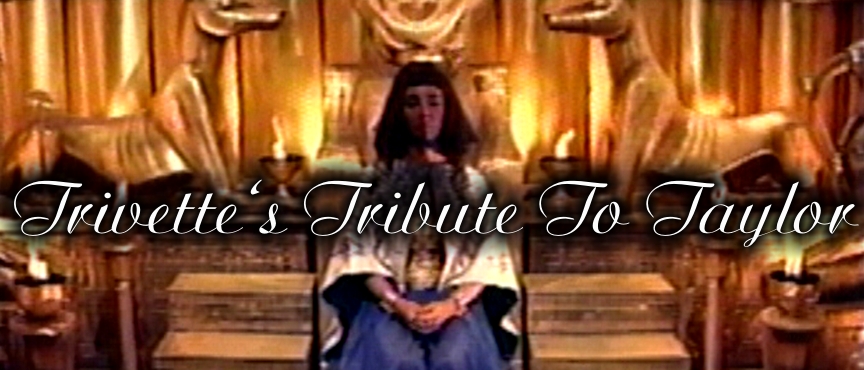
The High Priestess and her assistants are kneeling before her, a reflecting pool between them. The priestess is using the pool to divine events and prepare Cleopatra for what lies ahead. [Subsequent script revisions proposed re-shooting this scene using a firepit, as used in the other "incantation" scenes throughout the film.]
The High Priestess prostrates herself. A pause. Cleopatra opens her eyes...
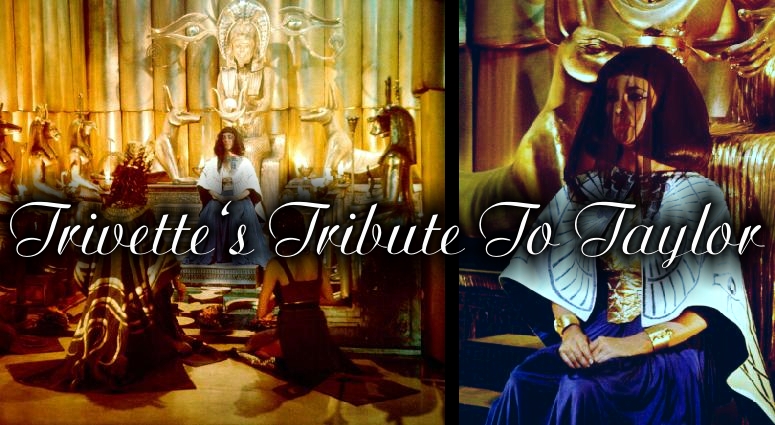
The High Priestess stares into the shallow pool before her. She makes an encircling motion with her arms. The water becomes agitated, with ever-increasing ripples...
The waters of the pool become quiet. Another pause. Cleopatra rises, removes her veil, and places it on the goddess. Leaving the temple, she heads for her command tent.
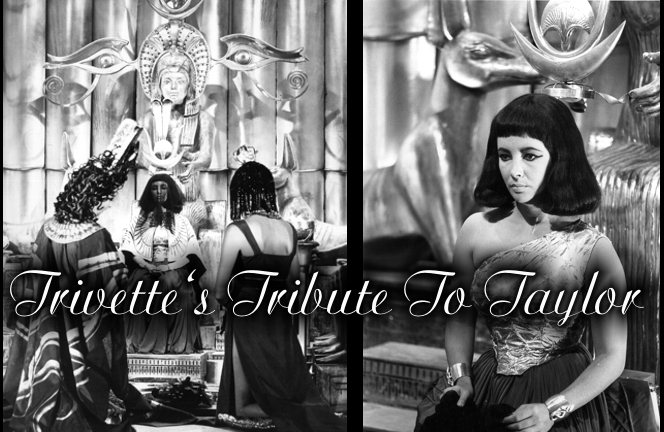
[The vision reveals just a hint of what is coming..."...blown on the waves, the winds of destiny." This is the first use of the "incantations" that will dot the film, each successive one revealing events with increasing clarity and precision.]